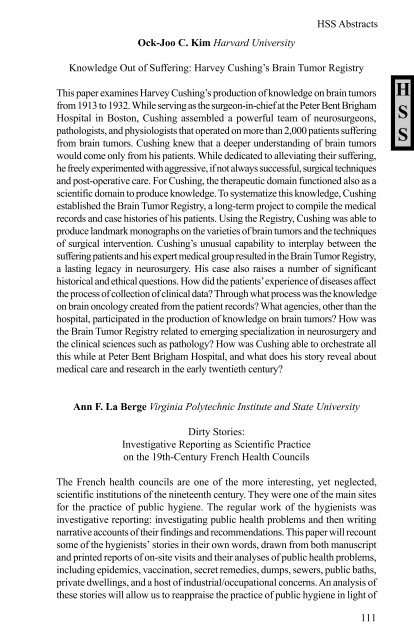2000 HSS/PSA Program 1 - History of Science Society
2000 HSS/PSA Program 1 - History of Science Society
2000 HSS/PSA Program 1 - History of Science Society
You also want an ePaper? Increase the reach of your titles
YUMPU automatically turns print PDFs into web optimized ePapers that Google loves.
Ock-Joo␣ C. Kim Harvard University<br />
<strong>HSS</strong> Abstracts<br />
Knowledge Out <strong>of</strong> Suffering: Harvey Cushing’s Brain Tumor Registry<br />
This paper examines Harvey Cushing’s production <strong>of</strong> knowledge on brain tumors<br />
from 1913 to 1932. While serving as the surgeon-in-chief at the Peter Bent Brigham<br />
Hospital in Boston, Cushing assembled a powerful team <strong>of</strong> neurosurgeons,<br />
pathologists, and physiologists that operated on more than 2,000 patients suffering<br />
from brain tumors. Cushing knew that a deeper understanding <strong>of</strong> brain tumors<br />
would come only from his patients. While dedicated to alleviating their suffering,<br />
he freely experimented with aggressive, if not always successful, surgical techniques<br />
and post-operative care. For Cushing, the therapeutic domain functioned also as a<br />
scientific domain to produce knowledge. To systematize this knowledge, Cushing<br />
established the Brain Tumor Registry, a long-term project to compile the medical<br />
records and case histories <strong>of</strong> his patients. Using the Registry, Cushing was able to<br />
produce landmark monographs on the varieties <strong>of</strong> brain tumors and the techniques<br />
<strong>of</strong> surgical intervention. Cushing’s unusual capability to interplay between the<br />
suffering patients and his expert medical group resulted in the Brain Tumor Registry,<br />
a lasting legacy in neurosurgery. His case also raises a number <strong>of</strong> significant<br />
historical and ethical questions. How did the patients’ experience <strong>of</strong> diseases affect<br />
the process <strong>of</strong> collection <strong>of</strong> clinical data? Through what process was the knowledge<br />
on brain oncology created from the patient records? What agencies, other than the<br />
hospital, participated in the production <strong>of</strong> knowledge on brain tumors? How was<br />
the Brain Tumor Registry related to emerging specialization in neurosurgery and<br />
the clinical sciences such as pathology? How was Cushing able to orchestrate all<br />
this while at Peter Bent Brigham Hospital, and what does his story reveal about<br />
medical care and research in the early twentieth century?<br />
H<br />
S<br />
S<br />
Ann␣ F. La␣ Berge Virginia Polytechnic Institute and State University<br />
Dirty Stories:<br />
Investigative Reporting as Scientific Practice<br />
on the 19th-Century French Health Councils<br />
The French health councils are one <strong>of</strong> the more interesting, yet neglected,<br />
scientific institutions <strong>of</strong> the nineteenth century. They were one <strong>of</strong> the main sites<br />
for the practice <strong>of</strong> public hygiene. The regular work <strong>of</strong> the hygienists was<br />
investigative reporting: investigating public health problems and then writing<br />
narrative accounts <strong>of</strong> their findings and recommendations. This paper will recount<br />
some <strong>of</strong> the hygienists’ stories in their own words, drawn from both manuscript<br />
and printed reports <strong>of</strong> on-site visits and their analyses <strong>of</strong> public health problems,<br />
including epidemics, vaccination, secret remedies, dumps, sewers, public baths,<br />
private dwellings, and a host <strong>of</strong> industrial/occupational concerns. An analysis <strong>of</strong><br />
these stories will allow us to reappraise the practice <strong>of</strong> public hygiene in light <strong>of</strong><br />
111
















